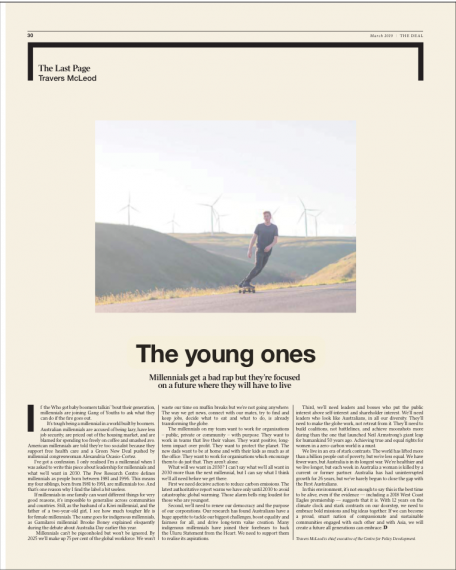Published in the Australian on Friday, 15 Mar 2019 – Page 30
The young ones
Millennials get a bad rap but they’re focused on a future where they will have to live
If the Who got baby boomers talkin’ ’bout their generation, millennials are joining Gang of Youths to ask what they can do if the fire goes out.
It’s tough being a millennial in a world built by boomers. Australian millennials are accused of being lazy, have less job security, are priced out of the housing market, and are blamed for spending too freely on coffee and smashed avo. American millennials are told they’re too socialist because they support free health care and a Green New Deal pushed by millennial congresswoman Alexandria Ocasio-Cortez .
I’ve got a confession. I only realised I’m a millennial when I was asked to write this piece about leadership for millennials and what we’ll want in 2030. The Pew Research Centre defines millennials as people born between 1981 and 1996. This means my four siblings, born from 1981 to 1991, are millennials too. And that’s one reason why I find the label a bit useless.
If millennials in one family can want different things for very good reasons, it’s impossible to generalise across communities and countries. Still, as the husband of a Kiwi millennial, and the father of a two-year-old girl, I see how much tougher life is for female millennials. The same goes for indigenous millennials, as Gamilaroi millennial Brooke Boney explained eloquently during the debate about Australia Day earlier this year.
Millennials can’t be pigeonholed but won’t be ignored. By 2025 we’ll make up 75 per cent of the global workforce. We won’t waste our time on muffin breaks but we’re not going anywhere. The way we get news, connect with our mates, try to find and keep jobs, decide what to eat and what to do, is already transforming the globe.
The millennials on my team want to work for organisations – public, private or community – with purpose. They want to work in teams that live their values. They want positive, long-term impact over profit. They want to protect the planet. The new dads want to be at home and with their kids as much as at the office. They want to work for organisations which encourage them to do just that. They aren’t alone.
What will we want in 2030? I can’t say what we’ll all want in 2030 more than the next millennial, but I can say what I think we’ll all need before we get there.
First we need decisive action to reduce carbon emissions. The latest authoritative report warns we have only until 2030 to avoid catastrophic global warming. Those alarm bells ring loudest for those who are youngest.
Second, we’ll need to renew our democracy and the purpose of our corporations. Our research has found Australians have a huge appetite to tackle our biggest challenges, boost equality and fairness for all, and drive long-term value creation. Many indigenous millennials have joined their forebears to back the Uluru Statement from the Heart. We need to support them to realise its aspirations.
Third, we’ll need leaders and bosses who put the public interest above self-interest and shareholder interest. We’ll need leaders who look like Australians, in all our diversity. They’ll need to make the globe work, not retreat from it. They’ll need to build coalitions, not battlelines, and achieve moonshots more daring than the one that launched Neil Armstrong’s giant leap for humankind 50 years ago. Achieving true and equal rights for women in a zero-carbon world is a must.
We live in an era of stark contrasts. The world has lifted more than a billion people out of poverty, but we’re less equal. We have fewer wars, but Australia is in its longest war. We’re healthier and we live longer, but each week in Australia a woman is killed by a current or former partner. Australia has had uninterrupted growth for 26 years, but we’ve barely begun to close the gap with the First Australians.
In this environment, it’s not enough to say this is the best time to be alive, even if the evidence — including a 2018 West Coast Eagles premiership — suggests that it is. With 12 years on the climate clock and stark contrasts on our doorstep, we need to embrace bold missions and big ideas together. If we can become a proud, smart nation of compassionate and sustainable communities engaged with each other and with Asia, we will create a future all generations can embrace.
Travers McLeod is chief executive of the Centre for Policy Development.
Copyright © 2019 The Australian




